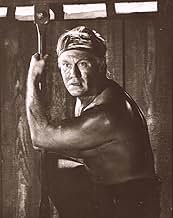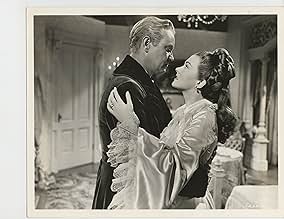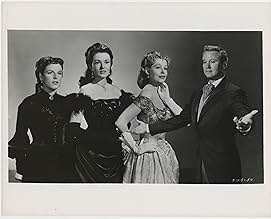अपनी भाषा में प्लॉट जोड़ेंRip MacCool has learned early in life that "money talks" and after he arrives in San Francisco, he has no qualms about being ruthless in business, and his first fast-deal bilks Ada Stritch o... सभी पढ़ेंRip MacCool has learned early in life that "money talks" and after he arrives in San Francisco, he has no qualms about being ruthless in business, and his first fast-deal bilks Ada Stritch out of her hotel. A combination of shrewd deals and playing the stock market builds him a f... सभी पढ़ेंRip MacCool has learned early in life that "money talks" and after he arrives in San Francisco, he has no qualms about being ruthless in business, and his first fast-deal bilks Ada Stritch out of her hotel. A combination of shrewd deals and playing the stock market builds him a financial empire. He marries Lily Douvane, who presents him with a child, but Lily has some... सभी पढ़ें
- Shocker
- (as Lon Chaney)
- Minister
- (बिना क्रेडिट के)
- Asst. Foreman
- (बिना क्रेडिट के)
- Guard
- (बिना क्रेडिट के)
फ़ीचर्ड समीक्षाएं
This was a box office bomb. Part of the problem may be the story's lead character. It's a story of capitalism and cold-hearted melodrama. Rip is not a hunky romantic lead. He's the quintessential money-grubbing hustler working the system. It's all about the money and not even what you could buy with it. It does turn into a complicated soapy melodrama and that loses me in the second half. It's listed here as a western although it's a western like Dallas (TV) is a western.
This film has some oddly named characters - Phil MacCool and Flutey Johnson - ha ha! Someone must have had some fun making up comedy names.
The story is ok and the film is alright to watch. It gets a bit boring, though, and the characters don't really blow you away.
One thing I've never understood about banks and today's society is how they have so much influence on everything. Banks essentially don't have any money! So, how come countries owe each other trillions of dollars or whatever? That money simply doesn't exist. If everyone wanted their money withdrawn from the banks at the same time, the banks would all collapse (that is the threat in this film). This is because banks don't have enough money! Why do we base our whole society on such a false premise and promulgate this deception? There is not enough money, folks. All banks are broke!
We need to scrap money and progress to a different sort of society. One that could include a game of cards to settle disputes. You could start with 'snap' for youngsters and progress to more grown up games as you get older. This film leaves you to make your mind up about that winning hand.
I detail this opening because it sets up the movie's remainder in compelling fashion. As the flashbacks show, McCool appears driven by only one thing- money. However, a softer side emerges in his relationship with his two buddies (Johnny and Shocker) and his second wife Zoe. So perhaps his inner life is not as cut-and-dried as his many big money operations make it seem. Thus, a greater moral ambiguity emerges as the flashbacks progress, each peeling back a layer in McCool's troubled life. Credit under-rated screenwriter Guy Trosper for both the incisive screenplay and the story concept. A gander at his credits over the years demonstrates an outstanding talent.
Actor Brian is excellent as the central character, especially convincing as a ruthless operator. Surprisingly, McCambridge gets a bit of romance and exhibits flashes of sympathy as the put-upon Ada. At the same time, Chaney gets a likable role as the loyal Serbian sidekick Shocker, while Sullivan has a secondary part that may have been a studio add-on.
Anyway, the movie strikes me as something of an oddity coming from big budget MGM. The film itself is in b&w, but well mounted, particularly the crowd scenes. At the same time, it's an exception that neither of the two headliners has a particularly likable role, which is not the usual way of promoting headliner careers. But then 1951 was also a time when the studio was branching into darker themes under new honcho Dore Schary, and away from L.B. Mayer's sunny wholesome fare. That may explain the movie's hybrid status, somewhere between an A and B production.
All in all, the film strikes me as something of a sleeper, particularly in it's construction, theme, and absolutely appropriate ending. Perhaps it's the rather dour subject matter, and morally ambivalent leads that have reduced the 75-minutes to real obscurity. In my little book, however, the movie definitely merits a measure of re-discovery.
क्या आपको पता है
- ट्रिवियाThis film was a huge flop at the box office, resulting in a loss to MGM of $1,282,000 (over $13.1M in 2020) according to studio records.
- भाव
Rip MacCool: [discussing his plan to buy the hotel from Ada, with items laid out on the dresser] Watch, money, $2,000 worth of Mona Lisa.
Shocker: Like for bait rabbit trap.
Rip MacCool: Same technique exactly. First the rabbit is curious, then greedy
[moves extended arm in downward motion]
Rip MacCool: ... then the sky falls.
Shocker: You no ever feel sorry for rabbit?
Rip MacCool: I think the good Lord made rabbits to be eaten.
- कनेक्शनFeatured in The Metro-Goldwyn-Mayer Story (1951)
टॉप पसंद
विवरण
- रिलीज़ की तारीख़
- कंट्री ऑफ़ ओरिजिन
- भाषा
- इस रूप में भी जाना जाता है
- Hårda bud
- फ़िल्माने की जगहें
- उत्पादन कंपनी
- IMDbPro पर और कंपनी क्रेडिट देखें
बॉक्स ऑफ़िस
- बजट
- $17,23,000(अनुमानित)
- चलने की अवधि1 घंटा 27 मिनट
- रंग
- पक्ष अनुपात
- 1.37 : 1



































